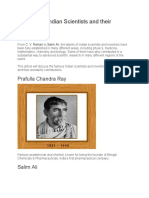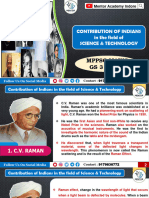PIONEER SCIENTISTS
OF INDIA
A scientist is someone who conducts scientific research to
advance knowledge in an area of interest. In classical
antiquity, there was no real ancient analog of a modern
scientist. Instead, philosophers engaged in the
philosophical study of nature called natural philosophy, a
precursor of natural science.
�1 – A.P.J Abdul Kalam
Avul Pakir Jainulabdeen Abdul Kalam made
significant contributions to Indian satellite and
launch. Vehicles of Indian Space and Research
Organisation (ISRO) and to the missile programme
of Defence Research and Development Organisation.
He is also called the”Missile Man of lndia”. He also
served as the 11th president of India from 2002 to
2007. He has also written many famous books such
as Wings of Fire, India 2020, Ignited Minds and
many more.
�2 – C.V Raman
Sir Chandrasekhara Venkata Raman was an Indian
physicist who made groundbreaking works in the field
of light scattering. With his student K. S. Krishnan, he
discovered that when light traverses a transparent
material, some of the deflected light change wavelength
and amplitude.This phenomenon was a new type of
scattering of light and was subsequently known as the
Raman effect. Raman won the 1930 Nobel Prize in
Physics and was the first Asian person to receive a
Nobel Prize in any branch of science.
�3 – S.N Bose
Satyendra Nath Bose was an Indian mathematician and
physicist specialising in theoretical physics. He is best known
for his work on quantum mechanics in the early 1920s,
collaboration with Albert Einstein in developing the
foundation for Bose–Einstein statistics and the theory of the
Bose–Einstein condensate. A Fellow of the Royal Society, he
was awarded India’s second highest civilian award, the Padma
Vibhushan in 1954 by the Government of India. He served
on many research and development committees in sovereign
India.
�4 – P.C Ray
Acharya Sir Prafulla Chandra Ray was an eminent
Bengali chemist, educationist, historian, industrialist
and philanthropist. He established the first modern
Indian Research School in Chemistry and is
regarded as the father of chemical science in India.
He was also the author of “The History of Hindu
Chemistry”, which has been recognised worldwide.
He also actively participated in politics along with
Gandhi ji and GK Gokhale.
�5 – Homi J. Bhabha
Homi Jehangir Bhabha was an Indian Nuclear physicist,
founding director and professor of physics at the Tata
Institute of Fundamental Research. He is also known as
“Father of Indian Nuclear Programme” . Bhabha was
adopted Adams Prize in 1942 and Padam Bhushan
1954 and was also adopted for Nobel Prize in 1951 and
1953-1956. He was also the founding director of the
Atomic Energy Establishment, Trombay which is now
renamed as Bhabha Atomic Research Centre in his
honour.
�6 - Jagadish Chandra Bose
Jagadish Chandra Bose was a Biologist, Physicist,
Botanist and an early writer of science fiction. He is also
known as “Father of Radio Science” and the “Father of
Bengali Science Fiction”. He pioneered the investigation
of radio and microwave optics, made significant
contributions to plant science, and laid the foundations
of experimental science in the Indian subcontinent. He
invented the crescograph, a device for measuring the
growth of plants. A crater on the moon has been named
in his honour.
�7 – Meghnad Saha
Meghnad Saha was one of the best
astrophysicists of India who developed the Saha
ionization equation, used to discribe chemical
and physical conditions in stars. His work
allowed atronomers to accurately relate the
spectral classes of stars to their actual
temperatures. He was elected to the parliament
of India in 1952. He was the founder of a
magazine called Science and Culture.
�8 – Birbal Sahni
Birbal Sahni was a great Indian Paleobotanist who studied
fossisls of Indian subcontinent. He also took an interest in
geology and archaeology. He established the Institute of
Paleobotany at Lucknow which was named after him. His
major contribution were in the study of Fossil plants of
India and in plant revolution. He was also involved in the
establishment of Indian Science education and served as
the president of the National academy of science, India
and as an honorary president of the International Botinical
Congress, Stockholm.
�By – Urjivi Pandey
Class- 8 B
th

























































































